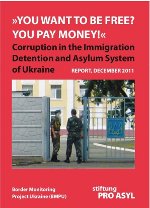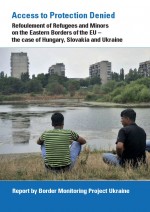In March 2012, Barbara Lochbihler (chair of the Subcommittee on Human Rights of the European Parliament) sent an official request to the European Commission concerning the detention of Somalis in Ukraine. Furthermore, Dr. Bärbel Kofler, member of the German parliament and chair of Ukraine-Germany interparliamentary Group sent an official request to the German government.
On the 1th of August the European Commission answered:
The HR/VP looks at the detention of Somali asylum-seekers in the context of Article 5 of the European Convention of Human Rights. The EU Delegation in Kyiv has been in contact with the authorities, the United Nations Refugee Agency (UNHCR) and IOM in order to support the efforts to resolve the situation. The hunger strike has now ended and steps are being taken by the Ukrainian authorities to ensure adequate treatment of every person concerned.
Projects financed by the EU provide legal assistance and advice on procedures to the persons concerned on a regular basis. Lawyers from partner non-governmental organisations (NGOs) inform migrants of their rights and advise on procedures including applications for asylum. The EU will continue to work with organisations such as IOM and UNHCR to improve Ukraine’s capacities in this field, and additional funding focusing on migration and asylum policies will be made available soon.
In the longer term, our aim is to ensure that the asylum issue is tackled through a comprehensive reform, building the right capacities at national level.
Home affairs issues, including asylum, are discussed in regular dialogue with Ukraine, including at the Justice and Home Affairs Ministerial, Subcommittee meetings as well as in the context of the Visa Dialogue. The action plan on Visa Liberalisation of November 2010 contains specific benchmarks on, inter alia, asylum policy and also on fighting corruption. The progress reports on the implementation by Ukraine of the first (legislative) phase of the action plan on Visa Liberalisation were presented to Parliament and are available online(1).
The fight against corruption is kept high on the agenda of the EU’s dialogues with Ukraine, at all levels.
(1) http://ec.europa.eu/home-affairs/news/intro/docs/20120209/UA%202nd%20PR%20VLAP%20SWD%202012 %2010 %20FINAL.pdf
Unfortunately, this statement of European Commission leaves more questions than it provides answers. Despite the fact that the mentioned EU-funded projects focussing on “legal assistance” completely failed to prevent an obvious violation of Article 5 of the European Convention of Human Rights – the mass detention of Somalis in Ukraine – the European Commission does not say a word concerning the establishment of the two new detention centres in Ukraine. It is therefore important to stress again that it was the European Union who put pressure on Ukraine to implement a border regime preventing the entry of potential asylum seekers to the territory of the European Union. Even more, “technical support in the amount of 140 thousand Euro has been recently provided to two detention centres in Rozsudiv (Chernigov oblast) and Zhuravichi (Volyn oblast) (…). That was in addition to substantial financial assistance of the EU to the Ministry of Internal Affairs of Ukraine for actual establishment of those facilities in 2008” (source).
A legal review on the detention of detainees according to international standards is de facto not existing in Ukraine. Former detainees reported to BMPU that they were locked in a mini bus in front of the court during their “court hearing” or that the court only asked the questions “Where are you from” and “Where are you going” in a court procedure that did not take longer than 10 minutes. Furthermore, “there is no adequate and fair asylum procedure in Ukraine and its asylum system fails to comply with international law” (amnesty international 2010).
It is cynical in the extreme that the European Commission states: “In the longer term, our aim is to ensure that the asylum issue is tackled through a comprehensive reform, building the right capacities at national level.” And in the short term? Detention for all potential asylum seekers even it is a clear violation of the European Convention of Human Rights and other international conventions concerning the rights of refugees and migrants?
Regarding the statement of the European Commission that “lawyers from partner non-governmental organisations (NGOs) inform migrants of their rights and advise on procedures including applications for asylum” it must be noted that the hunger strikers described this “help” as absolutely useless. Weather they were released nor they can expect a fair asylum procedure.
Furthermore, an independent monitoring procedure on human rights issues in detention can’t be expected from NGOs involved in IOM projects like GUMIRA or SIREADA. Does the European really think that IOM independently reports about human rights violation in detention centres which were build up before with the help of IOM/ICMPD-projects like ERIT or CBMM (more information about these projects can be found in this article)?
http://bordermonitoring-ukraine.eu/files/2012/09/SF-7-51-52-MdB-Kofler1.pdf



